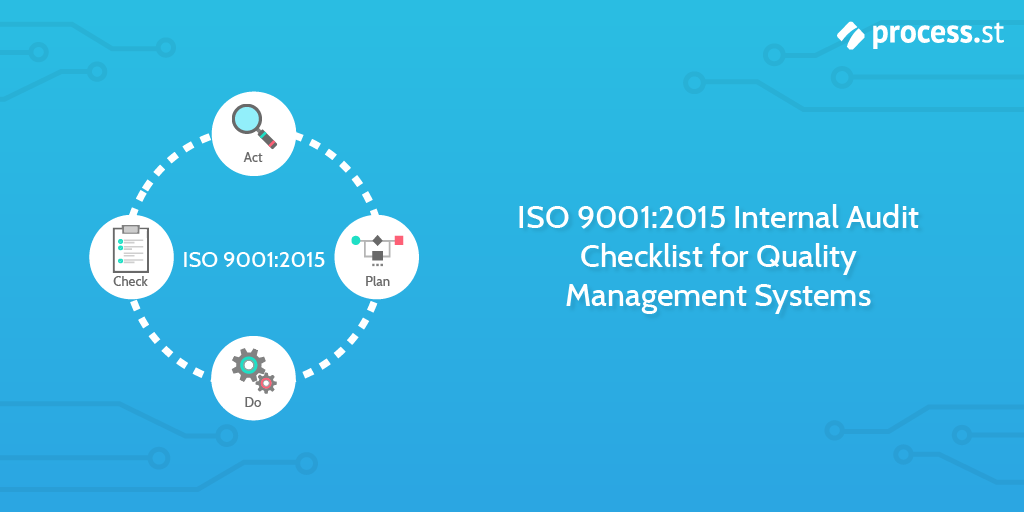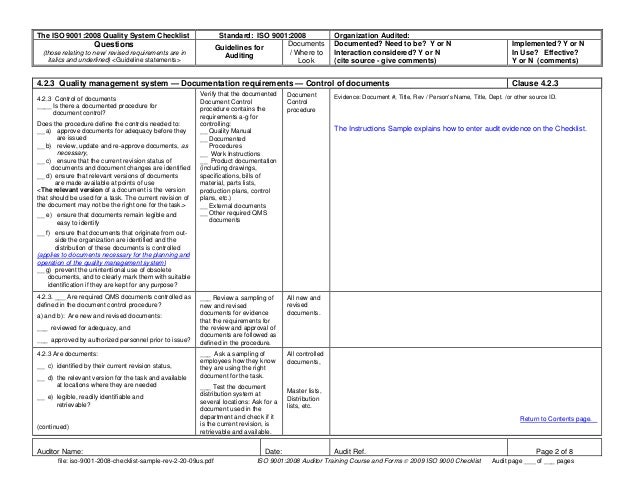ISO 9001:2015 Internal Audit Checklist & Tools. Establish an effective ISO 9001 Internal Audit Program. ISO consultant in Pune- Implementing ISO 9. Checklist for Training Process Audit - Free download as Word Doc (.doc), PDF File (.pdf), Text File (.txt) or read online for free.
For a company to get ISO 9001 certification and meet the requirements of the standard, internal audit is an important and mandatory activity for the organisation. Internal auditors review the processes and system of the organisation and review the outcome with senior management. The purpose of these reviews is to identify how proficiently the company is carrying out risk management and whether the processes are in compliance with the set standards. Another objective of internal audit is to identify the areas that need improvement.
ISO 9001 Internal Audit Checklist Questions

- (ISO 9001 Clause 6.2.2) (ISO 14001 Clause 4.5.4) (AS/NZS 4801 Clause 4.5.3) (OHSAS 18001 Clause 4.4.2) While answering yes to all these questions does not assure total compliance to ISO 9001, ISO 14001, AS/NZS 4801, or OHSAS 18001, it does pick up on some of the key aspects of an integrated management system.
- Internal Quality Management System Audit Checklist (ISO9001:2015) Q# ISO 9001:2015 Clause Audit Question Audit Evidence 4 Context of the Organization 4.1 Understanding the organization and its context 4.1q1 The organization shall determine external and internal issues that are relevant to its purpose.
Internal Audit consists of a number of questions that needs to be asked during the audit and if you have conducted audits in the past, you know nothing is worse as running out of your questions during the audit. However, this problem can be overcome by preparing and planning the questions to be asked and use then as guidance during the audit. ISO 9001 internal audit checklist questions ascertain the scope of organisation’s Quality Management System and its conformance with the ISO 9001standard set by ISO. The ISO 9001 standard includes clauses with essential requirements from Section 4.0 to section 10.0. ISO 9001 internal audit checklist questions should be able to validate an organisation or departments compliance with all of the requirements from ISO 9001 and internal procedures used.
Below are some of the essential questions that should be considered while making your own ISO 9001 internal audit checklist.
What is the context of your organisation?
According to Clause 4 and 4.1 of ISO 9001:2015 this is the first things to consider when developing a Quality Management System (QMS). It therefore also makes sense to cover it in the beginning of the audit and can be considered as the starting point. According to this clause the organisation should understand the external and internal issues that can have an impact on the organisations strategy and may affect its capability to achieve the required results. External issues include items related to legal, cultural, technological, social, market and financial areas. Internal issues include issues associated to e.g. values, performance and culture within an organisation. Questions related to this should be asked to the senior management of organisation or the head of QMS. A SWOT (Strength, Weaknesses, Opportunities and Threats) Analysis is one of the tools an organisations often use to help understanding their context. However, it should be noted use of these tools is not a requirement from the standard.
How do you understand the needs and expectations of interested parties?
Clause 4.2 is all about interested parties and their needs and expectations. Knowledge about the interested parties is as important as understanding of context in auditing. Interested parties have significant influence on the organisation’s capabilities to make sure that their products and services meet the customer’s requirements. It is important for the organisation to regularly analyze who their interested parties are and how they can affect the organisations ability to provide their product or service.
How the senior management describes leadership and commitment for QMS?
According to the clause 5 and 5.1 of ISO 9001:2015, senior management should show leadership and commitment in relation to the QMS by taking accountability for the effectiveness of QMS and by making sure that quality policies and procedures are accustomed for the QMS and are relevant to the context of organisation. It is also important to communicate, explain and apply the quality policy within the organisation effectively. Moreover, the higher management should ensure that the resources for QMS are readily and available and required results are achieved.
How are the risks and opportunities detected and addressed?
According to clause 6, for effective implementation of QMS it is necessary for the organisation to review the issues identified in clause 4.1 and requirements of interested parties in clause 4.2 and determine any risks or opportunities associated with it. Any risks and opportunities shall be addressed to ensure that the implemented QMS will produce the required results and prevent unwanted effects.
Describe how resources are identified for execution and maintenance of the QMS?
The organisation need to have mechanisms in place to identify any resources needed to provide its products or services. This should include personnel as well as equipment and infrastructure as e.g. office space and buildings for production.
How are operations required to meet demands of products or service planned and controlled?
In relevance to clause 8 of ISO 9001:2015, the organisation shall plan and control the operations required to meet the demands of products or service. This is done by identifying the requirements of product or service from interested parties as the customers and then set up a criteria for the acceptance of products and service. This likewise include controls that ensure consistency of the organisations output.
Each of these questions can be split into several sub questions for a more in-depth assessment. It you are interested in outsourcing your internal audit program and would like a free consultation on how we can help, please contact us to arrange it.
Continue to Outsourced Internal AuditBy eqms|November 25th, 2019|Articles|Comments OffShare This Story, Choose Your Platform!
FacebookTwitterLinkedInIso Audit Checklist
RedditTumblrPinterestVk Email
EmailRelated Posts
How to Develop an Efficient Internal Audit Process?GalleryHow to Develop an Efficient Internal Audit Process?
What are the Benefits of IMS?Iso 9001 Audit Checklist
GalleryWhat are the Benefits of IMS?
Required ISO 17025 Laboratory ProceduresGallery
Required ISO 17025 Laboratory Procedures
Implementing an ISO 14001 Waste Management System Gallery
Gallery